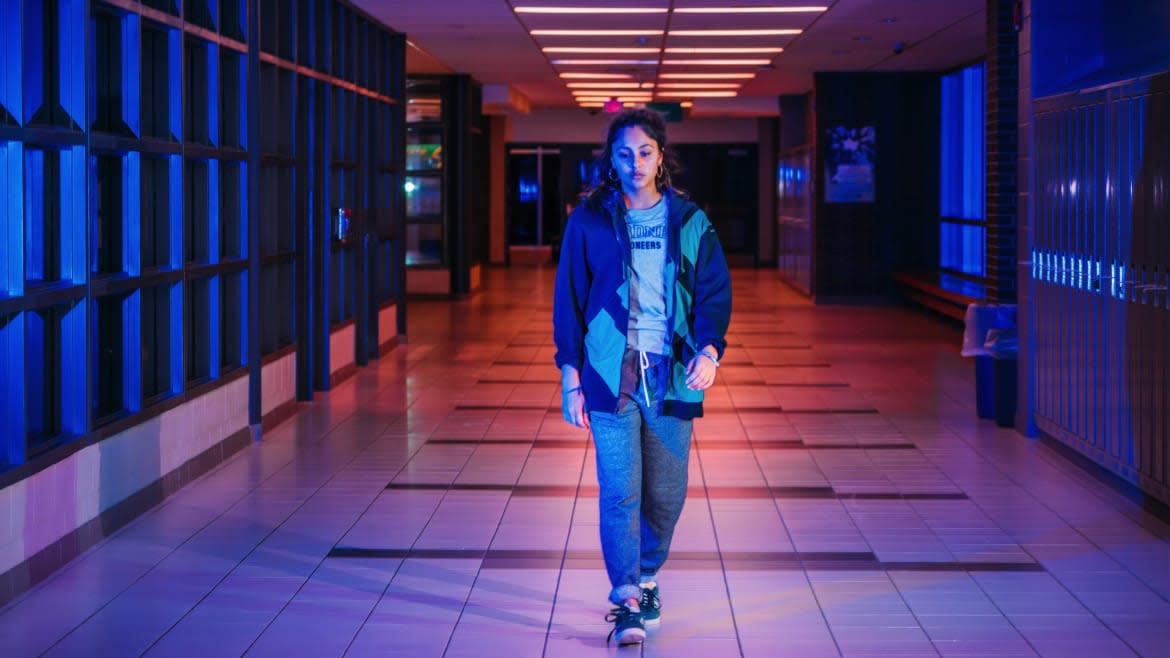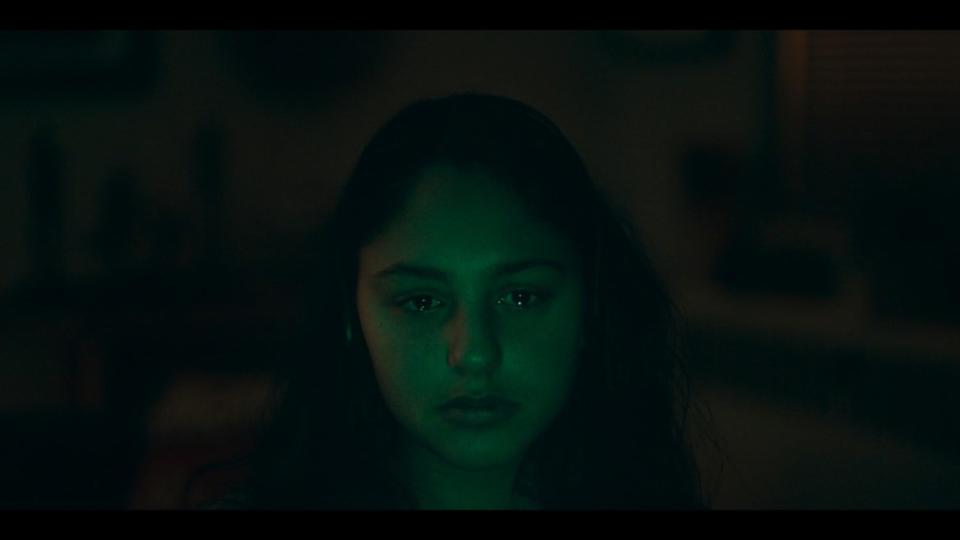‘Share’: The Twisted Tale of a Teen Girl’s Sexual Assault, Captured on Video for Her High School to See

The pings of an iMessage text alert haunt Share in both quiet and busy moments, when the teenage girl they’re meant to torment is at school or at home. They announce themselves briefly in the background as she talks with her mom; neither glances down. They ping during lunch in a bustling cafeteria, where a teammate reminds her she can block those numbers. She has, though; they just start coming from new ones. A beat later, the conversation turns to pizza. Papa John’s or Little Caesars? This is all part of their new normal.
Even the camera, directed by first-time feature filmmaker Pippa Bianco, can’t be bothered at the sound of those pings to break its gaze on the girl, a 16-year-old student athlete named Mandy (Rhianne Barreto). It’s much more intent on her brown eyes, their brightness and passivity as the plates start to shift underneath her world, reconfiguring how she moves in it. We never learn who is sending those texts or what they’ve said; only that the pings contribute to the static that’s invaded her mind ever since she passed out at a party and woke to find photos and videos of her sexual assault spreading among her classmates.
Bianco’s film, which earned awards at Sundance and debuted Saturday on HBO, is stubbornly, transcendently understated in the horror of the scenario it depicts. It pulls its lights, colors, and sounds from ordinary suburbia—the off-putting orange of street lamps, the staid, fluorescent glow of a 7-11—yet creates images as intimate as a dream. It acknowledges that pure intentions don’t prevent terrible mistakes, and that in real life, relationships are often too knotty to transmute suddenly into friends and enemies, or villains and victims.
More importantly, Share is a collection of snapshots that illustrate, on a second-by-second basis, what it’s like to return to the mundanity of everyday life after a deeply dehumanizing experience. Bianco grounds us in Mandy’s perspective from the moment we see her hand, then hear her breath, as she wakes up on her parents’ lawn in the film’s first scene. We’re with her as confusion becomes alarm becomes the slow, fuzzy dawning of realization as she discovers bruising on her arm in her parents’ bathroom, then undresses to shower and stops to stare below her waist.
Based on Bianco’s Cannes award-winning short of the same name, Share is above all a mood piece—exceptional at producing the paradoxical sensations of heaviness and weightlessness that pull Mandy into a listless haze as she sits at her family’s dinner table or among chatty classmates. We sense it in her as she insists she’s OK, attends basketball practice, and walks into rooms full of teenagers that hush all at once at the sight of her.
The Rape Culture That Fueled Steubenville Still Thrives Online. Here’s Why That Matters.
The writer-director is especially nuanced in her depictions of those teenagers. Even the star basketball player in Mandy’s friend group, the one seen in the video pulling her pants down and who later tells her he thought it was “funny,” like a prank, like that time they duct-taped Dylan to the couch, come on, don’t be like this—even he gets short moments that complicate our image of him. Through a car window, we see him walking into school with his hood up, isolated from the other kids. He quietly pays for Mandy’s slurpee at a gas station when he and two mutual friends run into her, and invites her to hang out with them later, a subdued look of shame on his face.
The boy’s father walks up to Mandy and her father at a hardware store to offer an apology; it’s sincere and warranted, but he says, “We didn’t raise him to act like that.” He says, “He’s a good kid.” Mandy’s dad, Mickey (J.C. MacKenzie) is sweet and unassuming but overwhelmed by the magnitude of what he’s witnessed in those videos—her mother (played by Poorna Jagannathan), on the other hand, understands all too well what the world will do to teenage girls—and he snaps. Mandy’s shame and heartbreak as she watches her dad, uncharacteristically furious, throw himself back into his truck with fresh cuts on his cheek is one of the film’s most painful moments.

A sense of dread permeates nearly every scene which takes place in public, as we (and Mandy) brace for the explosive showdown, taunting, or retribution that seems inevitable every time she rounds a corner. We wonder who’s watching, what they see, what they think of her—and so does she. One scene escalates this low-level paranoia into a near-blind panic in the school kitchen. But there’s rarely more than those pings, which soon fade into the background. The effect is like floating underwater, an image Bianco makes explicit in a shot of Mandy washing dishes, the camera submerged along with her hands.
Share dedicates most of its 89-minute runtime to Mandy’s state of mind, though the film still does due diligence in depicting the maddening uphill battle that meets victims of sexual assault. As her parents pursue criminal charges—then a civil suit when the assault case stalls, despite the video evidence—Mandy initially goes along with it. But more than anything, she simply wants to know what happened. To remember how she ended up on the lawn and what explains the harsh bruising on her lower back. To know exactly what was done to her body and by whom.
She only gets partial answers in a trickle of downplayed information. No catharsis or sudden revelations set Mandy’s world back the way it was before. But as played by 21-year-old Barreto—a relative unknown who won the Special Jury Award for Achievement at Sundance for her performance in Share—there’s an irrepressible vitality to Mandy crucial to how the film shades her in, making her more than just a victim. She decides for herself what she is, what she likes—“I just like going to parties and I like hooking up with people,” she tells her dad—and who she doesn’t want in her life. She goes to prom. She moves on, slowly, without the easy answers Hollywood might be tempted to provide.
It’s a familiar, ordinary portrait of a girl in America.
Got a tip? Send it to The Daily Beast here
Get our top stories in your inbox every day. Sign up now!
Daily Beast Membership: Beast Inside goes deeper on the stories that matter to you. Learn more.
